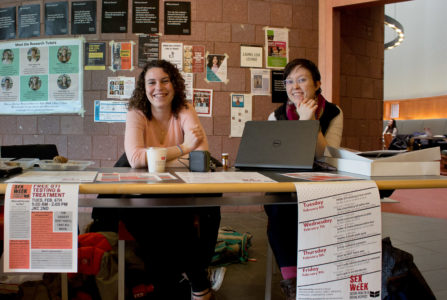
The week of Feb. 5 has been designated “Sex Week” at Grinnell College. The week of workshops and activities is designed to enhance all students’ understanding, communication and pleasure, no matter their personal decisions regarding sex.
According to Emily Howe ’16, who coordinated the many different groups behind Sex Week, the event began when the Student Government Association (SGA) and Sexual Health Information Center (SHIC) began work on bringing STI testing back to campus, a service that was lost when Central Iowa Family Planning left Grinnell in 2016. The event would not have been possible without the effort of Deb Shill and other Student Health and Counseling Services (SHACS) staff members, who are paying for and coordinating STI testing. The week kicks off with this free STI testing Tuesday (and free ice cream!) in the JRC, and continues with an array of events ranging from the chemistry of sex, to how to have better sex, to how not to have sex at all. It all culminates with a “Get it on Gardner” dance hosted by SHIC.
All Grinnell students come to campus with a different understanding of sexual respect and sexual health, and Howe hopes that Sex Week can achieve a greater shared knowledge base. Without events like these, gaps in understanding can arise and serious miscommunication can ensue.
“There’s no point where you know all the things there [are] to know — how to relate to someone, how to have conversations about sex, how to talk about having an STI or how to talk about getting STI tested with your partner,” Howe said. “Every time we have these conversations and we get students thinking we’re increasing awareness around sexual respect.”
Howe believes that Grinnell College is tremendously sex positive, but she also believes that could lead to complacency, especially in regard to sexual health.
“A lot of Grinnellians may feel a false sense of security because condoms are readily available or … we’re comfortable looking at signs that say sex week. … Students may have a false sense of security, [thinking] ‘Oh, it’s great that STI testing is coming to campus, but it’s not for me. I’m good.’ But statistically one in two sexually active people will have an STI by the time they’re 25, so it’s really important to have testing, and it’s really important to continue conversations.”
The planning of Sex Week began in November, long before sexual respect controversies rocked the country and without movements like #MeToo and Time’s Up in mind. Nevertheless, Sex Week provides an ideal time for this conversation to continue.
According to Howe, issues of consent and healthy relationships are “on everyone’s mind right now,” and “it’s something really trending on social media, trending on campus — it’s trending in classrooms, and this week provides a platform for people to talk about that — for people to think about those things more, to think about their health, and their health in the context of relationships.”
Overall, Sex Week is about the power of an individual to choose.
“We want students to have safer sex … and more pleasurable relationships … whether that [means] more pleasurable sex or whether that’s thinking about how you can be intimate and loving or just intimate in a relationship with someone without having sex,” Howe said. “No matter their sexual preferences, all students are encouraged to attend events during sex week to listen, learn and enjoy.”
























































Jean Donaldson • Feb 3, 2018 at 12:11 pm
Thanks for an affirmative perspective. Very educational!